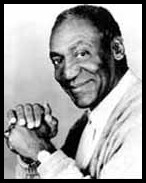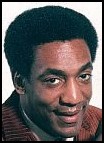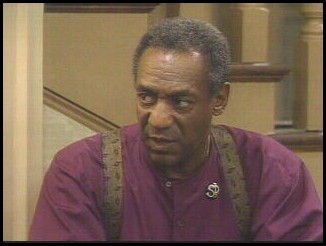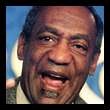|
Actor/comedian, Bill Cosby, was born on July 12, 1937 in Philadelphia, Pennsylvania and has become one of the most influential performers of the second half of the 20th century. His live appearances have been selling out nightclubs, concert halls and arenas across the country for four decades; he has had an unparalleled career in television; he is the best-selling comedian of all time on records; his blockbuster books have sold millions of copies; and his generous support of numerous charities, particularly in the field of education, have endowed many Americans with the gift of hope and learning. However, it is through his groundbreaking appearances on television, particularly in two landmark series each of which defined an American decade, that Bill Cosby has most decisively touched the lives of millions of Americans.
In the 1960s, "I Spy" broke the racial barrier in television by featuring Cosby as the first-ever black lead of a weekly dramatic series. In the 1980s, Cosby returned to television with a show that Coretta Scott King described as "the most positive portrayal of black family life that has ever been broadcast." "The Cosby Show" enjoyed years of number-one ratings and nearly unanimous critical praise. The show single-handedly resurrected the moribund sitcom genre and helped lift NBC from last place to first in the ratings by portraying, according to Newsweek, a diametrically opposite side of the black experience than what had previously been seen on television: "a tightly nuclear, upscale family coping with the same irritations and misunderstandings that afflict their white counterparts." Cosby's TV clan was the very model of a strong, close-knit, parent-dominated unit. "The fact that the family is black, without making a particular point of it," reported Time magazine, "is an encouraging sign of maturity in matters of race."
Coming from a poor Philadelphia neighborhood, Bill Cosby represents the voice of the vast, ordinary world out there. Everyone seems to easily identify with his characters and the situations they find themselves in. Cosby's humor often centers on the basic cornerstones of our existence, seeming to provide an insight into our roles as men and women, family members, children, parents. He points out the humor in our lives, and for that we are grateful. "He is Everyman and also his own man,' said Mel Gussow in the New York Times "A witty American humorist in complete touch with the source of his material: himself."
As a boy, Cosby saw little of his father, a mess steward in the Navy. His mother was the major influence and his first audience member. It didn’t take him long to begin making up gags and practicing routines on her, and she always encouraged his inventive performances of everyday household happenings. He attended elementary school with his pals Fat Albert, Old Weird Harold, Dumb Donald, Weasel, and many of the other memorable characters later immortalized in his comedy routines. He left tenth grade to join the Navy and finished high school via a correspondence course while still in the service. When he was discharged, he enrolled at Temple University in Philadelphia, hoping to become a physical education teacher. To support himself he tended bar at night, where he found another readymade audience for his brand of home-grown humor.
Word of Cosby's talent spread north to New York, he left school to perform in Greenwich Village clubs, and within a year landed a guest spot on "The Tonight Show." The year was 1963 and Cosby revolutionized American comedy. At the peak of the civil rights movement, Cosby was unique among black comedians of the time in not using race as a subject. "I don’t think you can bring the races together by joking about the differences between them," he said. "I’d rather talk about the similarities, about what's universal in their experiences."
In 1965, Cosby made the transition from stand-up comedian to actor with the series "I Spy" and changed the face of television. Coinciding with the crest of the civil rights movements, the series’ light touch was "balm for the jangled American psyche of the time," said the New York Times. It was a historic moment in casting when a black man was placed along side a white man as his equal and it created international interest in the show and in the young comedian, who won three Emmy Awards.
Feature films roles soon followed, including his debut in the Civil War drama Man and Boy, Hickey and Boggs, with Robert Culp; Uptown Saturday Night with Sidney Poitier and Harry Belafonte and its sequel Let's Do It Again; Mother, Jugs and Speed with Raquel Welch, A Piece of the Action, again with Poitier, and most recently Jack, with Robin Williams.
He won several Grammy awards for comedy albums, had a top forty song ("Little Old Man") in 1969, and sang on a number of albums. He won more Grammies for comedy than any other artist, winning every year from 1965 to 1970 and again in 1987. He has had 21 albums on the national pop charts (three in the Top 10 and three more in the Top 20) which have earned him five Grammy Awards. As of 2005, he had 3 gold- and 6 platinum-certified comedy albums. He has also written several humorous books about different aspects of life, based on his stand-up comedy such as Fatherhood and Love and Marriage. In fact, Fatherhood and Time Flies were the best selling non-fiction hardback books of 1986 and 1987, respectively.
There was also more television. After "I Spy" came the drama "The Bill Cosby Show" in 1971, a comedy variety show called "Cos" in 1976, "The Cosby Mysteries" in 1994, and "Cosby" on CBS, plus specials and daytime childrens programs such as "The Electric Company," "Sesame Street," and the critically acclaimed Saturday-morning cartoon series "Fat Albert and the Cosby Kids." It was, though as the main attraction and chief architect of "The Cosby Show," that Bill Cosby, in the words of Time magazine, "dominated the medium as no star has since the days of Lucille Ball and Milton Berle." With its gentle humor, upbeat message, and cross-cultural appeal 'The Cosby Show" entranced viewers week after week from 1984-92, with the simple but refreshing message that "people are many things simultaneously. ‘Race' is one such thing, but it isn’t the only one and it isn’t always the primary one." (The New York Times).
Cosby's success on television has been matched in other areas. In 1986 he broke Radio City Music Hall’s 53-year-old attendance record for his concert appearance. Cosby's also a giant in the publishing world. Fatherhood (1986) became the fastest-selling hardcover book of all time, remaining for more than half of its fifty-four weeks on The New York Times Best Seller List as Number 1. It has sold 2.6 million hardcover copies and 1.5 million paperbacks. Time Flies had the largest single first printing in publishing history--1.75 million.
A crusader throughout his career for a better world, his great success in the world of entertainment is complemented by his involvement with a host of charity organizations, making substantial gifts in support of education, most notably to predominantly black colleges and to various social service and civil rights organizations.
On the evolution of his own style of comedy, Bill Cosby states that he was drawn at an early age to the masters of jazz, learning to emulate in comedy their ability to take an idea and continually find new and innovative ways of expressing the same theme. The legacy of Bill Cosby's comedic genius is as sweet, meaningful and universal as any piece of music ever played.
|




